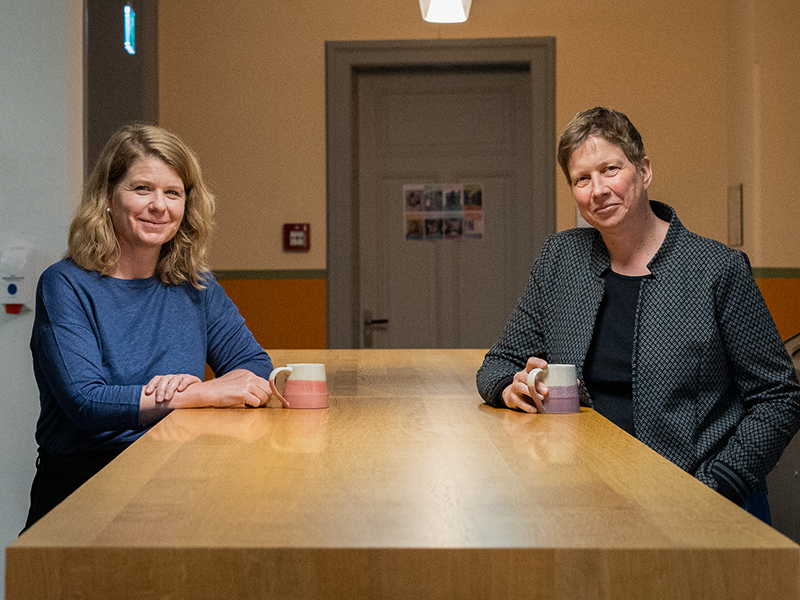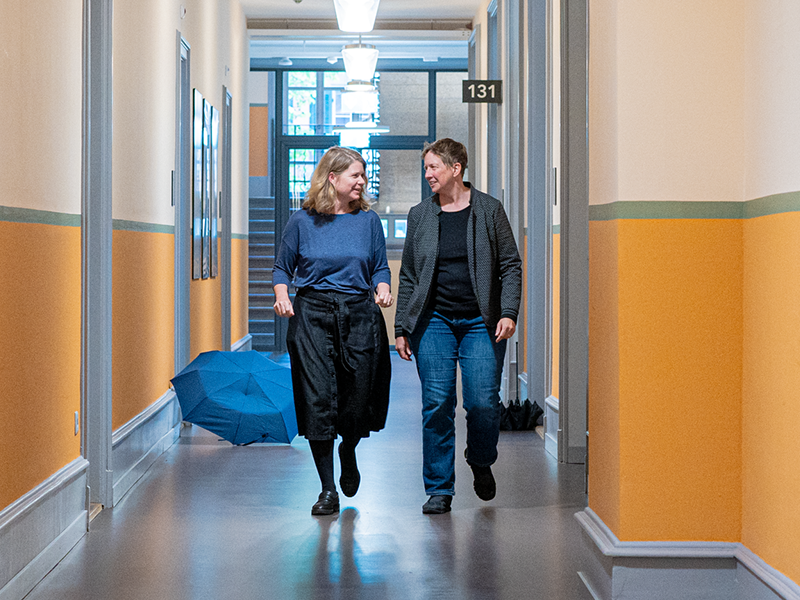Women’s health
“There is a great lack of basic knowledge about female bodies”
Women are disadvantaged in all areas of the Swiss healthcare system. This is the conclusion of a study by the Interdisciplinary Centre for Gender Studies (ICFG) at the University of Bern. An interview with two of the co-authors, Christine Bigler and Tina Büchler.

Gender inequalities are a ‘critical factor’ for public health: The UN officially stated this as early as 1995, almost 30 years ago. It is no secret that these inequalities are predominantly to the disadvantage of women. The much-cited example of a heart attack – which is more often fatal in women because it manifests itself differently than in men – has now made the public aware of this fact. On behalf of the Federal Office of Public Health, the ICFG carried out systematic research into the extent to which and in which areas there are still disadvantages in Switzerland today. The authors identified the main problem areas and propose measures for a gender-equitable healthcare system.
Christine Bigler: No, not in principle. But we were surprised at the extent and depth to which women are disadvantaged. It is also astonishing just how much gender-sensitive research is lacking in the health sector and how much this affects medical treatment.
Tina Büchler: We were unaware of how far the disadvantages extend not only in research and treatment, but also in diagnostics, rehabilitation and prevention. The examples of this are so numerous and diverse that we ended up discovering that it is not just a case of examples, but in fact a systematic approach.
How can this be determined in the case of research?
Bigler: There are very few researchers in the field of gender-sensitive medicine in Switzerland, especially at professorship level. The numbers are so small that we were able to consult most of these specialists for our study.
Büchler: In addition, gender-sensitive research and offers in Switzerland are highly personal. When Basel Professor of Psychiatry Anita Riecher-Rössler was given emeritus status, for example, the consultation hours on menopause and psychotropic drugs during pregnancy were lost, even though they were in high demand. Consultations on psychotropic drugs, for example, would be very important, because women often have problems with these drugs. This shortcoming contrasts with international models: In the UK, for example, certain gender-sensitive services are institutionalized and included in the service mandate of a hospital.
“There is a lack of reliable gender-sensitive data for the entire Swiss healthcare system”
Christine Bigler
How does basic research compare to clinical research?
Büchler: We were quite shocked that in basic biomedical research and in academic medical research, there is still a massive over-representation of male cells, animals and humans. This means that there is a great lack of basic knowledge about female bodies.
Women are better represented in clinical trials, such as drug approvals, but still under-represented. And women are also under-represented among researchers in many academic fields. On the other hand, it has been proven that the more women researchers there are in a field, the more women’s health issues are researched.
Bigler: Coupled with the lack of institutionalization, this results in very large research gaps. There is a lack of reliable gender-sensitive data for the entire Swiss healthcare system.
With what consequences?
Büchler: This gap has tangible disadvantages for women. For example, it leads to inappropriate dosages in chemotherapy or in treatment with psychotropic drugs, with the result that women suffer more side effects and have a worse prognosis. At the same time, there are still many issues that have not yet been systematically investigated. Although many gender-specific phenomena are sufficiently well known in practice, insufficient research funding is allocated to their investigation.
Despite the research gaps, how could you conclude that women are disadvantaged in all areas of Swiss healthcare?
Bigler: Our study was very broad-based. First, we identified six main areas based on an in-depth analysis of the scientific literature, collaboration with internal experts from gender medicine and gender health, and interviews with external experts. We worked on these six problem areas in stakeholder workshops with more than 60 people, including practitioners such as doctors, psychologists, outpatient care, prevention and rehabilitation specialists. From this, we were able to derive measures that could be used to remedy deficits in women’s healthcare.
However, we also used international studies as a comparison. As a result, we were able to determine that the shortcomings we identified in Swiss healthcare correspond to international data. Although other countries also have gender-related research gaps.
The exclusion of women and female animals from research is often justified by the fact that their hormonal cycle causes fluctuations and could, to some extent, falsify the results. What is your view on this from a scientific point of view?
Büchler: The idea of the ‘disturbing’ female cycle persists in medical research. Firstly, it is forgotten that around 50% of the population are women and have a menstrual cycle! If this were to be taken seriously, targeted research would have to be carried out into the effects of the female cycle and the variability could be captured in the data. Which of course does not happen if we exclude this half of the population. And it has to be said that in all this we have not even addressed the proportion of the population that is neither male nor female.
Secondly, this belief – one could almost call it a myth – ignores a growing number of studies showing that variability in certain biomedical traits is greater within the male population than between male and female populations. This shows that what you want to investigate and how you look at it is crucial.
“The idea of the ‘disturbing’ female cycle persists in medical research”
Tina Büchler
Even the general public is well aware of the fact that a heart attack manifests itself differently in women than in men and is therefore often detected too late or not at all in women.
Bigler: Nevertheless, the specialists we interviewed say that it still takes longer for a woman to be diagnosed with a heart attack in Switzerland. A Swiss study from 2023 shows that women with cardiovascular diseases are admitted to intensive care units less often than men of the same age, even though their disease progression is similar or even more severe.
However, it is not only diagnostics that are experiencing a delay. The deficits also extend into therapy and continue into rehabilitation: Female cardiovascular patients undergo rehabilitation less often and for a shorter period of time than men, although cardiac rehabilitation can reduce the mortality rate and the number of re-hospitalizations. Possible reasons for this are that women are offered rehabilitation less often or that care work prevents them from doing so because they are more likely to look after relatives, such as their children or parents.
Which brings us to gender roles. Why is it so important, as you emphasize in your report, to differentiate between biological sex and gender as social sex?
Büchler: With regard to biological sex, it should be clear that the different physical conditions of all genders must be taken into account in the field of health. Even here, however, a fundamental rethink is needed: The healthcare system is still strongly anchored in a binary concept of gender that assumes only one male and one female gender; other gender forms are neglected.
Gender as the social sex, on the other hand, is socially learned and is reflected in role behavior and gender stereotypes in the minds of researchers, practitioners and personal health behavior.
“Dementia is a striking example of the potency of gender as social sex”
Christine Bigler
Bigler: Dementia is a striking example of the potency of gender as social sex. Although women are significantly more affected than men, dementia disorders such as Alzheimer’s are diagnosed less often or later in women. Because of their gender, women are more adept at communicating and perform better in memory tests. It would therefore be desirable to make the tests gender-sensitive. In this case, this would mean a dementia test tailored to women.The example of skin cancer also illustrates how gender influences health behavior. Women care for their skin better than men, they are more likely to moisturize, go for a massage and see a beautician. This is why early detection of skin cancer is better in women than in men.
Are men lagging behind in other areas of health – as far as you know, even though men’s health was explicitly not part of your mandate for this study?
Büchler: Yes, for depression and breast cancer, for example. Depression is underdiagnosed in men because it is more likely to be associated with women due to prevailing gender images. Breast cancer is also underdiagnosed because it is highly taboo in men and is also considered a typical female disease in medical practice. Breast cancer affects one man in one hundred cases.
Bigler: For men, there is also a great need for gender-sensitive research in the area of prevention. Due to their gender roles, men are generally less aware of their state of health and use health services less often than women. In order to appeal to men in a more targeted manner, prevention and health promotion should also be gender-sensitive for them.
“Gender stereotypes can fundamentally harm men just as much as women”
Tina Büchler
Büchler: In summary, it can be said that gender stereotypes can fundamentally harm men just as much as women. Overall, however, the disadvantage suffered by men is disproportionate to the disadvantage suffered by women. The ‘man as the norm’ has significantly more far-reaching consequences for women. However, it is important to note that gender-sensitive healthcare benefits all genders, not just women.In the second part of your research, you put forward proposals for measures based on your findings. What are the most important recommendations for the FOPH?
Bigler: Basically, a dual strategy is needed: For the benefit of women and all genders, specialized expertise in gender health and gender medicine should be promoted and developed in the healthcare system. However, this knowledge must then also find its way into research and practice. This means that this knowledge must not be treated as an extra ‘add-on’, but as an integral part of the healthcare system. Integral means that biological sex and social gender must always be considered in a fundamental way.
Gender knowledge needs to be mainstreamed in all areas of healthcare, including education and training in healthcare professions. An additional Professorship for Gender Medicine is not enough. This dual strategy is also important with regard to personalized medicine, which is currently experiencing strong international growth. Gender health and gender medicine must form a central component here.
“Gender knowledge needs to be mainstreamed in all areas of healthcare”
Christine Bigler
Büchler: A key measure is therefore more basic research, especially specifically for Switzerland. This is the only way to develop specific evidence-based measures. There is currently a lack of data on this in many places.Is NRP 83, the National Research Program for Gender Medicine and Health launched by the Swiss National Science Foundation at the end of 2023, a step in this direction?
Büchler: Yes, this research program is absolutely necessary, it is an important start. We also very much welcome the fact that the program is called Gender Medicine and Health, which means that it is not limited to the medical aspect. Because, to stress the point once again, in addition to scientific approaches, greater attention must also be paid to the social gender. If this continues to be neglected, equality between men and women in the Swiss healthcare system will remain unattainable.
An interdisciplinary approach that takes into account social-scientific and psychological as well as economic approaches is therefore essential. It is also important that measures – such as prevention – aim at overcoming obstructive stereotypes.
It is extremely important to systematically convey gender-specific knowledge in education, training and continuing education. It still takes too long for existing knowledge to be put into practice. While initial developments can be seen in basic medical training, we have not seen much movement in other professions in the healthcare sector. More attention should also be paid to continuing education and further training – people in senior management positions are hugely pioneering in often hierarchical systems and shape entire departments or institutions for decades.
Equally important are structural changes in the working world of the healthcare system: More women are needed in male-dominated fields such as surgery, and they are particularly needed in management positions. This means that the advancement of women must be continued – as well as the commitment to combating sexism, which is demonstrably omnipresent in many Swiss healthcare institutions.
The Federal Office of Public Health published the ICFG research report on its website on May 15, 2024 The Federal Council's postulate report, which is based on the ICFG research report, was also published on the website of the Federal Office of Public Health on May 15. The postulate by National Councillor Laurence Fehlmann Rielle is dated 21.06.2019. The University of Bern published its own press release on the ICFG research report titled “Women are disadvantaged in the Swiss healthcare system”, also on May 15, 2024. Dr. Christine Bigler is a Senior Researcher and has been working at the ICFG of the University of Bern since 2014. Her research interests focus on gender-based violence and health in the Global South and Switzerland. Dr. Tina Büchler is a senior researcher at the ICFG of the University of Bern. Her areas of expertise are social geography, migration, queer studies and qualitative social research methods. Discover stories about the research at the University of Bern and the people behind it.The ICFG report
Link to the ICFG report «Women's health. Better consideration of their characteristics».
The Federal Council's postulate report
Link to the Federal Council's report in fulfillment of postulate 19.3910 Fehlmann Rielle
The press release of the University of Bern
“Women are disadvantaged in the Swiss healthcare system”
About the person

Christine Bigler
About the person

Tina Büchler
Subscribe to the uniAKTUELL newsletter
